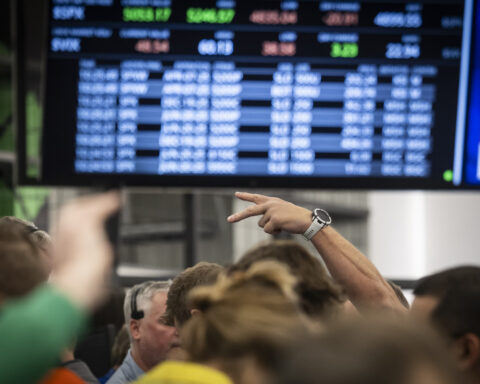By Georgina McCartney
HOUSTON (Reuters) - Oil prices settled down more than $1 a barrel on Tuesday at a four-year low as investors priced in an increasing likelihood of a recession due to the escalating trade war between the U.S. and China, the world's two biggest economies.
Brent futures settled down $1.39, or 2.16%, at $62.82 a barrel. U.S. West Texas Intermediate crude futures settled down $1.12, or 1.85%, at $59.58.
The two benchmarks have slumped by 16% since U.S. President Donald Trump's April 2 announcement of tariffs on all U.S. imports.
The U.S. will impose a 104% tariff on China from 12:01 a.m. EDT (0401 GMT) on Wednesday, a White House official said, adding 50% more to tariffs after Beijing failed to lift its retaliatory tariffs on U.S. goods by a noon deadline on Tuesday set by Trump.
Beijing vowed not to bow to what it called U.S. blackmail after Trump threatened the additional 50% tariff on Chinese goods if the country did not lift its 34% retaliatory tariff.
China's Commerce Ministry said the country would fight to the end, ratcheting up fears about a contraction of the global economy.
Both oil benchmarks continued to fall in post-settlement trade. U.S. crude futures dipped to $57.88, while U.S. stock indexes also broadly sank.
"The scenario has presented a case for a global recession, where fears of energy demand declining have emerged," Alex Hodes, director of market strategy at financial services firm StoneX, said in a note.
U.S. Trade Representative Jamieson Greer told U.S. senators on Tuesday that China has not indicated it wants to work toward trade reciprocity.
Goldman Sachs forecast that Brent and WTI crude prices would be at $62 and $58 a barrel, respectively, by December 2025, and at $55 and $51, respectively, a year after that, under different scenarios.
The U.S. administration has indicated a strong preference for reducing crude prices to $50 or lower, considering this goal a top priority among its objectives, according to Natasha Kaneva, head of global commodities strategy at J.P. Morgan.
"This includes being willing to endure a period of industry disruption similar to the one experienced by the shale sector during the 2014 price war between OPEC and shale, if it ultimately results in lower cost of oil production," Kaneva said.
IRAN TALKS
On Monday, Trump also made a surprise announcement that the U.S. and Iran were set to begin direct talks on Tehran's nuclear program, but Iran's foreign minister said the discussions would be indirect.
U.S. Energy Secretary Chris Wright said on Tuesday that Iran can expect tighter sanctions if it does not come to an agreement with Trump on its nuclear program.
"So absolutely, I would expect very tight sanctions on Iran, and hopefully drive them to abandon their nuclear program," Wright said in an interview on CNBC.
Meanwhile, U.S. crude and distillate inventories fell while gasoline stocks rose last week, market sources said, citing American Petroleum Institute figures on Tuesday.
Crude stocks fell by 1.1 million barrels in the week ended April 4, the sources said on condition of anonymity. Gasoline inventories rose by 210,000 barrels and distillate stocks fell by 1.8 million barrels, they said.
Official weekly oil inventory data from the Energy Information Administration is due on Wednesday.
(Reporting by Georgina McCartney in Houston, Ahmad Ghaddar in London; Additional reporting by Katya Golubkova in Tokyo and Emily Chow in Singapore; Editing by Deepa Babington, David Gregorio and Jamie Freed)

 Trump has begun another trade war. Here's a timeline of how we got here
Trump has begun another trade war. Here's a timeline of how we got here
 Canada's leader laments lost friendship with US in town that sheltered stranded Americans after 9/11
Canada's leader laments lost friendship with US in town that sheltered stranded Americans after 9/11
 Chinese EV giant BYD's fourth-quarter profit leaps 73%
Chinese EV giant BYD's fourth-quarter profit leaps 73%
 You're an American in another land? Prepare to talk about the why and how of Trump 2.0
You're an American in another land? Prepare to talk about the why and how of Trump 2.0
 Chalk talk: Star power, top teams and No. 5 seeds headline the women's March Madness Sweet 16
Chalk talk: Star power, top teams and No. 5 seeds headline the women's March Madness Sweet 16
 Purdue returns to Sweet 16 with 76-62 win over McNeese in March Madness
Purdue returns to Sweet 16 with 76-62 win over McNeese in March Madness








